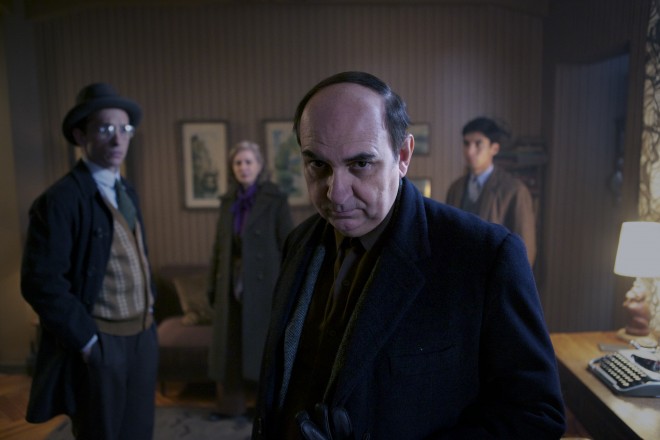
Dir.: Pablo Larrain; Cast: Luis Gnecco, Mercedes Moran, Gael Gabriel Bernal, Alfredo Castro; Chile/Argentina/France/Spain/USA, 107 min.
Chilean filmmaker Pablo Larrain has immersed himself in two iconic figures of the 20th Century to bring us films about Jacqueline Onassis and his fellow countryman Pablo Neruda, premiering at Venice and Cannes this year, respectively. NERUDA is not so much a biopic of the Nobel Prize winning poet, more a noirish character study of the man himself, in the format of a deconstructed detective novel.
In Chile 1948, President Videla (Castro) has joined the Cold War hysteria by arresting communists and putting them into concentration camps – one run by a certain Augusto Pinochet. Fleeing the police forces with his Argentine wife Delia del Carril, poet and Senator of the Republic, Pablo Neruda (Gnecco), is being hotly pursued by a part-factual and part-fictional detective Oscar Peluchonneau (Bernal), the putative son of a late police chief and a prostitute.
Aided and abetted by national sympathisers, Neruda enjoys a lifestyle which is anything but spartan: he and his wealthy wife are fond of the good life: but it does not detract him from writing his radical poems. Oscar belittles Neruda in his off-screen commentary, but at the same time he is in awe of him. The longer Neruda continues to evade him, the more Oscar becomes a pure invention of the writer who increasingly sees himself in a central role, everything revolving around him. In the third act, when Neruda escapes via the snowy Andes to Argentina, the duel between the poet and his creation becomes almost satirical.
Neruda was – like his Chilean compatriot Robert Bolano – an admirer of the detective novel, and Larrain plays the genre to perfection. The name Peluchonneau is a dead give-a-way: ‘peluche’ or a ‘stuffed toy animal’. The director weaves Guillermo Caldron’s script into a new form of magical realism: a form of noir, in which Neruda directs his own world, sometimes making fun of himself to deflect from the deadly game of reality. Oscar is somehow his alter-ego, very much an outsider, like himself: but the difference between them is that Neruda has never forgotten his impoverished childhood, he walked barefoot until the age of 12. Meanwhile Oscar is desperate to be the son of his father, who never really acknowledged him. Both men are pompous at times – pretenders; but Oscar lacks Neruda’s genius, and perhaps, more importantly, his courage to rebel.
Gnecco, a real look-alike, plays Neruda in the style of Cervantes, larger-than-life and always careful with his words in recording the most banal events for posterity. DoP Sergio Armstrong (The Maid) creates sumptuous, flowing images, the camera rolling over wild landscapes, starry skies and dark streets full of hidden danger, blacker than black. Chile is the 1940s is shown as a treacherous and exotic badland. The scenes in the brothel, where Neruda holds court, are reminiscent of early Renoir paintings. Larrain directs not so much with anger, as he did in The Club, but with a mischievous playfulness, never letting the audience forget the dangerous path the fearless poet is treading. Neruda’s works of art live on, giving voice to the fight against Fascism that engulfed his sub-continent for so long.
ON GENERAL RELEASE FROM 6 APRIL 2017